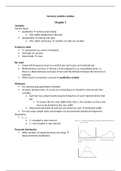Samenvatting
BBS1003-Statistics-Syllabus summary, lectures, videos, Andy Field
- Instelling
- Maastricht University (UM)
This summary scored me a 9.7 on the final exam! This document contains a summary of the statistics syllabus, notes from the lectures, notes on the video lectures and a summary of parts of Andy Field's statistics book.
[Meer zien]





